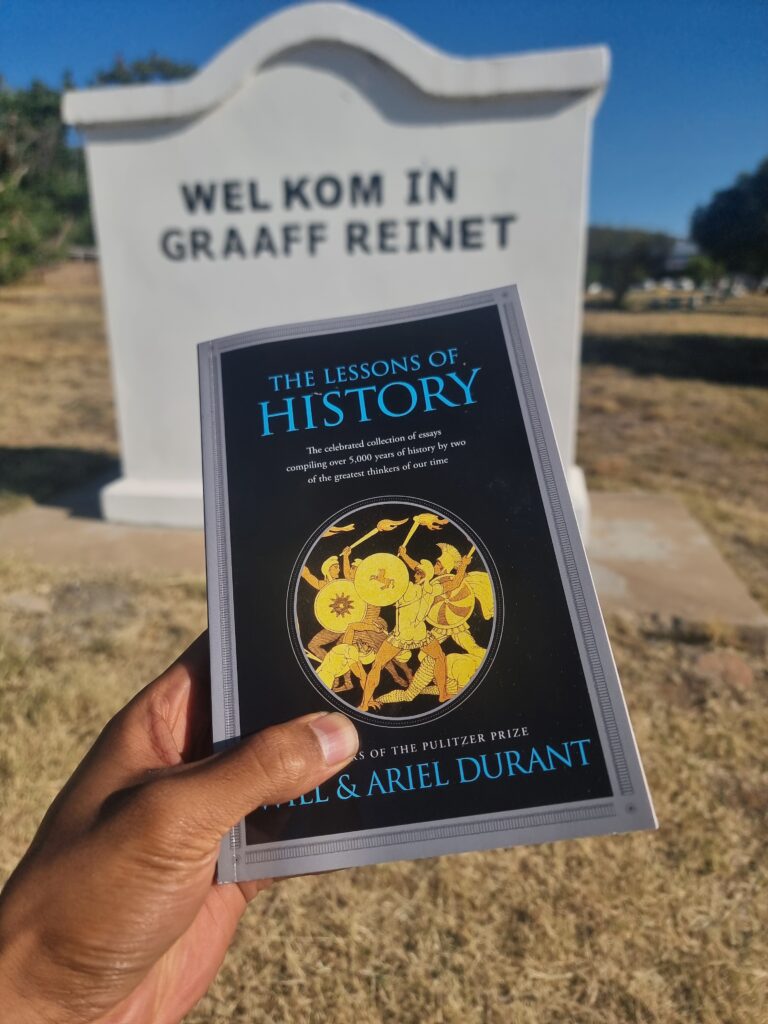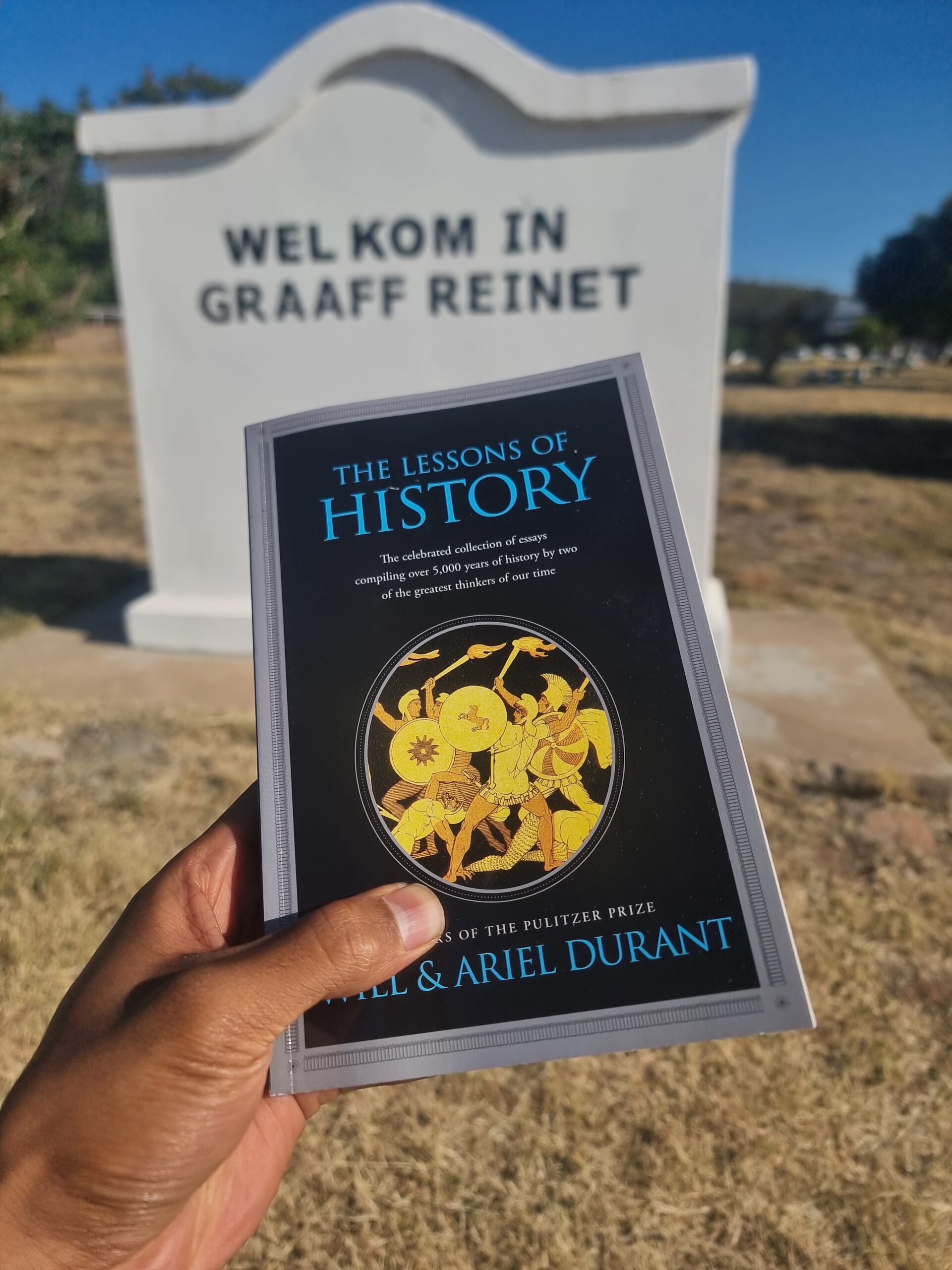
There’s a reason why The Lessons of History by Will Durant has been my Number ONE go-to book for the past eight years, and today I want to share why it holds such a special place in my life. I’ve been reading this book twice a month, every month, and it never fails to teach me something new. No matter how familiar the pages feel, each read seems to unlock a new layer of meaning. Whether it’s because of my own life experiences or the passing of time, I find myself seeing history and the world with deeper understanding each time.
This book’s wisdom comes through its simplicity, which makes it accessible yet profound. Will Durant’s reflections on history, power, and human behavior are timeless, and I find it almost impossible to argue with his logic. The more I read it, the more connected I feel to its core message.
Humility in Understanding History: Hesitations
The first chapter, “Hesitations,” perfectly sets the tone for Durant’s cautious approach to history. His statement, “Most history is guessing, and the rest is prejudice,” reflects his humility in dealing with the complexity of the past. He acknowledges how much of history is interpretation, making us wary of easy answers or fixed theories. Durant also says, “History smiles at all attempts to force its flow into theoretical patterns or logical grooves,” showing how unpredictable history really is. This humility is something I admire deeply because it recognizes that history doesn’t fit neatly into the boxes we often try to put it in. And how sweet is that ending line “Only a fool would try to compress a hundred centuries into a hundred pages of hazardous conclusions”
Compact Wisdom: Clear and Powerful Sentences
One of the things I love about Durant’s writing is how he can say so much with so little. He takes massive historical lessons and packs them into short, meaningful sentences. It’s both easy to read and full of depth, which is why I keep coming back to it. Every sentence feels like it has weight, and every time I read a passage, I notice something new.
Competition and Cooperation: A Reflection on Family
In the chapter “Biology and History,” Durant introduces a concept that’s both simple and profound: “The first biological lesson of history is that life is competition.” He explains that competition isn’t just part of economics or politics—it’s part of life itself. This really hit home for me because it put so many of my own life experiences into perspective. Durant highlights how we compete not only as individuals but also as groups—our families, communities, and nations all compete with others for survival and success.
But competition doesn’t exist in isolation. Durant writes, “Cooperation is real… we cooperate in our group—in our family, community, club, church, party, ‘race,’ or nation in order to strengthen our group in its competition with other groups.” This idea of cooperation and competition being interconnected gave me clarity on why people often cling to their beliefs and traditions, even when they seem irrational. It’s about survival, not just individually, but within the group.
This hit close to home for me, especially when I reflect on my own struggles with family and friends. I’ve had to distance myself from certain relatives because they attacked me for not sharing their religious beliefs. They were so entrenched in their group identity that they couldn’t accept me thinking differently, and it created a painful rift. It was only after reading Durant that I began to understand why they held onto those beliefs so tightly—their sense of survival, in a way, depended on it. Durant’s explanation gave me a sense of peace, knowing that these conflicts are not new or unique, but part of the larger human story.
The Initiative Individual: Ambition and Self-Determination
In “Character and History,” Durant highlights the importance of the “initiative individual”—those unique individuals who drive change and shape history. He emphasizes that history is often moved forward by such people, saying: “The great man, the hero, the genius… plays a formative role in historical change.” This speaks to me because I’ve always wanted more than just to follow along with the status quo. Like many others who strive for more, I want to innovate, build, and leave a lasting impact on the world and the people I know.
Growing up in poor circumstances in the South Durban Basin, I felt the pull of wanting to break out of the limitations that surrounded me. Durant’s insights into the “initiative individual” reminded me that it’s often ambition, determination, and the courage to challenge established norms that allow one to rise above. It also makes sense of the resistance I’ve faced from people around me—those who don’t understand the drive to grow can sometimes act as barriers, pulling you back.
More thoughts on this tension
The Conflict of New and Old Ideas: Creative Tension in History
One of the key insights that The Lessons of History offers is Will Durant’s exploration of the conflict between new and old ideas. Durant highlights how societies are constantly shaped by a dynamic struggle between conservatism and innovation. On one hand, there are forces that hold onto tradition and resist change; on the other, there are those who push forward, introducing new ways of thinking and doing. This constant push and pull creates what Durant calls a “creative tensile strength,” a term that perfectly captures the energy and progress that emerges from the clash of opposing forces.
Durant explains that this tension between conservatism and change is vital to the development of society. The “tensile strength” he refers to is an allusion to the fabric of society being stretched and tested by these conflicting ideas, much like how the physical strength of materials is increased through tension. Rather than seeing this struggle as destructive, Durant views it as a creative force that propels societies forward. It’s through this friction that new innovations, philosophies, and societal structures are born.
I find this idea brilliant because it explains so much about the way human history has unfolded. From the Renaissance to the Industrial Revolution, history is filled with examples of how creative tension between the old and the new has led to major advancements. Even in our personal lives, there’s often a conflict between what’s comfortable and established versus the desire to grow and innovate. Durant’s observation makes you see that this struggle is not only natural but necessary for progress.
In my own journey, I’ve felt this tension personally—whether it’s in trying to break away from old traditions or challenging societal expectations. It’s not easy, but as Durant reminds us, it’s through this struggle that new possibilities emerge.
Economics and Power: A Personal Reflection on Wealth
The chapter on Economics and History has had a profound effect on how I view money, wealth, and power. Durant states, “The men who can manage men manage the men who can manage only things, and the men who can manage money manage all.” This single quote opened my eyes to the importance of understanding the flow of money and how those who control it have an outsized influence on society. Wealth is more than just personal security—it’s a tool for shaping the future.
In reflecting on this, I think about Thomas Edison’s powerful words:
“I wonder what would have happened to me if some fluent talker had converted me to the theory of the eight-hour day and convinced me that it was not fair to my fellow workers to put forth my best efforts in my work. I am glad that the eight-hour day had not been invented when I was a young man. If my life had been made up of eight-hour days I do not believe I could have accomplished a great deal. This country (The USA) would not amount to as much as it does if the young men of fifty years ago had been afraid that they might earn more than they were paid for.”
Edison’s rejection of limiting norms mirrors my own ambition. I don’t just want a job that sustains me—I want to build something greater. I want to contribute more to the world.
Durant’s thoughts on money and power also emphasize that wealth shouldn’t be hoarded. He writes, “History is inflationary and money is the last thing a wise man will hoard.” Wealth should be put back into circulation, reinvested into projects, businesses, and innovations that create more value. This understanding has shifted my view of wealth from something to be stored to something that must be used to grow and create opportunities—not only for myself but for others.
Money Circulation: Building Wealth and Creating Impact
Durant’s lessons on economics have taught me that wealth grows through the re-circulation of money. When we spend, invest, or put money into projects, we are contributing to economic growth. This process not only helps build personal wealth but also drives job creation, innovation, and development. It’s like planting a seed that, when cared for, grows into something bigger than the initial investment.
I now see wealth as a means of contribution, not just accumulation. I want to create value and opportunities for others, and I recognize that the more I understand how money flows, the better I can control my financial destiny. This understanding has been transformative for me, shaping not just my view of money but also my broader life goals.
Race and History: Survival Across Millennia
In the chapter “Race and History,” Durant explores how different racial groups have survived and competed over millennia. His analysis of race consciousness—how people instinctively stick to their own racial group—made me rethink modern discussions about inclusion and identity. He shows that race is not a straightforward concept and that survival and competition among groups have shaped much of human history.
Durant walks through examples like the Anglo-Saxons dominating England after Rome’s fall or the Franks conquering Gaul and naming it France after themselves. These examples illustrate how race and survival have intertwined across centuries, shaping the world we live in today.
Measuring Progress: Control and Growth
Durant’s reflections on progress remind me that personal growth can be measured by how much control we have over our environment. His idea that progress comes from mastering our surroundings resonates deeply with me. Growing up in poverty, I’ve always strived to gain control over my circumstances and environment, and this idea of self-determination has been a central theme to my life.
For me, wealth is not just about personal gain—it’s about creating opportunities for others, contributing to society, and shaping the world in a meaningful way.
Conclusion
The Lessons of History is more than just a book; it’s a guiding framework for understanding life, human behavior, and society. Will Durant’s insights on competition, cooperation, power, wealth, and human nature have shaped the way I view my own experiences and ambitions. It’s a book that grows with you, and each reading reveals something new. I will continue reading it, and I hope others find in it the same transformative wisdom I have.
